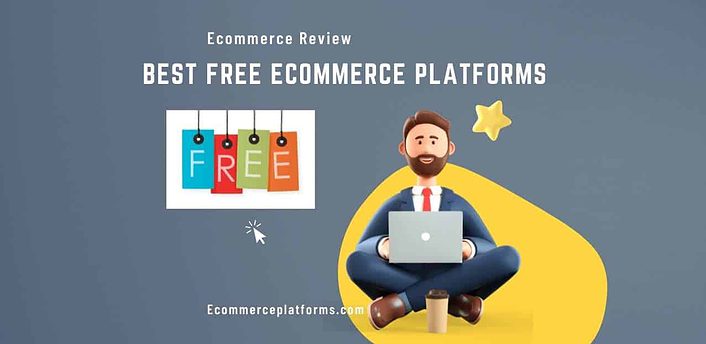Best Free Ecommerce Platforms – A detailed Review 2022
In an era of increased digitization, there has been a global increase in the demand for e-commerce. Unsurprisingly, 2020 saw the online market skyrocket as consumers turned to their devices to purchase physical products. Moreover, as we move into the post-pandemic world, the demand for online shopping is likely to grow.
If you’re running a small business and have a limited budget, don’t fret. There are plenty of options to assist you in expanding your business online without breaking the bank.
In this article, we’ll take a closer look at the most popular free and budget-friendly ecommerce platforms currently available. Plus, we’ll include a pros and cons list for each platform, so you can choose the one best suited to your needs.
The Rise of Ecommerce
For many of us, it’s difficult to imagine modern life without online shopping. Yet, when looking at e-commerce, we can trace its roots back to those good old “teleshopping” days 40 years ago. At the time, English inventor Michael Andrich introduced people to what would become known as e-commerce by connecting televisions and telephone lines. But, of course, the e-commerce we know and love today didn’t really start until Amazon first established its online presence in the early 1990s.
However, e-commerce platforms would cost thousands of dollars back then, preventing many individuals from moving their small businesses to the digital sphere. Fortunately, times have changed significantly, and we now have several free or low-cost options available for launching businesses online.

How to Choose the Best Ecommerce Platform?
Choosing the best e-commerce platform can feel a little overwhelming, considering so many available options. We’ll be completely honest with you – there’s no such thing as an entirely free e-commerce platform.
Having said that, taking your store into the digital sphere shouldn’t cost an arm and a leg. Here, we’ve compiled a list of e-commerce website builders offering the best bang for your buck and which feature free trials and free sign-up options.
WooCommerce
Considering it’s the most popular e-commerce platform globally, it feels only suitable to kick the list off with WooCommerce. This platform is ideal for beginners as well as more experienced business owners. Signing up is a straightforward process, allowing you to take your business online in a matter of minutes with zero hassle.
WooCommerce is actually a plugin for WordPress. This means you can use it as an additional feature to any WordPress site. If you’re well versed in WordPress, this is an optimal choice for you. However, even if you’ve never used WordPress before, it’s engineered to be highly beginner-friendly, guiding you each step of the way.
Once you’re all set up, you’ll be given complete control and creative freedom. WooCommerce offers hundreds of themes to choose from, allowing you to create an online presence that truly reflects your brand.
The best part is that the software is entirely free to use and can be downloaded via any web hosting provider.
There is a catch, however. WooCommerce doesn’t provide you with hosting. Instead, you’ll have to purchase it yourself with a domain name. Once you do so, your online site will be accessible to customers across the global market. Although you’ll need to pay for this, it doesn’t mean you have to pay over the odds. The folks at WooCommerce recommend using Bluehost or SiteGround to get started.
If you’re willing to pay for a paid plan, you can expect prices to range between $39-$79.
Pros
- Simple to use
- The individual has complete control
- WordPress compatible
- Transaction fees are not charged
- Sell digital and physical products
- Thousands of plugins are available
- Themes are extremely customizable
Cons
- You’ll need to buy hosting and domain name
- Can be tricky for beginners
- Limited to three free themes
Square Online
When it comes to setting up an online store, Square Online is a fantastic solution. It’s an easy-to-use platform guaranteed to push you in the right direction when it comes to launching your online business.
If you already have a physical store, you’re at an advantage – especially if you’re using Square Online’s POS system for payment processing. That way, you’ll be able to sync up your online store with your physical orders, making life a lot easier.
With the free plan, users can access a host of advanced features. Among these is selling an unlimited number of digital and physical products. Square Online is the perfect option for growing your business as much as you can before committing to paying for a website.
Of course, there are some limitations to the free plan. But don’t let that put you off. The free plan still gives you access to automatic inventory management, shopping cart functionality, integration with Pinterest and Instagram, and an automatic tax calculator.
If you find your online presence growing, you’ll be given the option of accessing a paid plan. The cheapest paid plan offered by Square Online features a free custom domain for your first year.
Pros
- Easy to set up
- Sell unlimited products
- Integrated with Pinterest and Instagram
- Automatic tax calculator included (applicable to U.S. only)
- Straightforward inventory management
- Set free or flat rate shipping options
Cons
- Templates have limited customization options
- Limited to Square’s in-house payment processing system
BigCommerce
Third, on our list of free e-commerce platforms is BigCommerce. It’s by far one of the best-known solutions available on the market today – and for a good reason. This platform includes an all-in-one, fully hosted feature to help introduce your business to the world of online selling. Hosted essentially means that this platform runs entirely on its own servers. This saves you from buying web hosting or installing additional software on your computer.
All that is required is a strong internet connection and access to a web browser. This means you can access this platform from pretty much anywhere.
Despite not technically having a free plan, the site does offer a 15-day free trial. And don’t worry, you won’t need to enter any credit card details to use this feature.
Once you’re up and running, you’ll have access to some fantastic features to help your online business thrive. This includes access to various payment methods. With this built-in integration feature, your options include PayPal powered by Braintree, Authorize.net, and Stripe – to name but a few.
Additionally, BigCommerce comes with a wide range of fully customizable templates. This way, you’re guaranteed complete control of your website’s design process. You will also be able to sell both physical and digital products, with additional marketing tools at your disposal to help optimize sales.
Pros
- Free trial
- Free domain
- Built-in integration with payment platforms
- Third-party apps can be added
- Customizable templates included
- Marketing tools
- Sell both physical and digital products
Cons
- Limited to 15-day free trial
- Restricted to using BigCommerce themes and add-ons

Drupal Commerce
Drupal is an open-source CMS digital platform experience that acts as the perfect crutch for expanding your business online. This platform gives small-to-large businesses the option of navigating their way to success without hassle.
The great thing about Drupal is that anyone can use it – whether you’re a startup business or have been in the game for years. Drupal is also more flexible when it comes to API development compared to sites like WordPress.
The most significant advantage of using Drupal Commerce is that it revolves around a free exchange of ideas and is free to download. However, if you wish to unlock more advanced features, you will need to sign up for a paid plan. It’s also worth noting that Drupal offers users the option to integrate payment gateways such as PayPal. Drupal also prioritizes accessibility, a crucial component of the modern digital e-commerce experience.
Pros
- Robust platform
- Accessible for anyone
- Free to download
- Beginner-friendly experience
Cons
- Not ideal for non-technical users
- Customization can be difficult
Shopify
Another e-commerce platform that boasts high success rates is Shopify. Again, this platform doesn’t offer a free plan but does let you take part in a 14-day free trial. However, Shopify gives its users the option to extend the trial period if they need more time to set up their online store.
Like BigCommerce, Shopify is another example of a hosted solution, removing the need for any additional downloads or software installations. It is also easily accessible from anywhere, assuming you have access to the internet and a web browser.
Today, Shopify has generated a staggering $400 billion in sales, powering over 3.7 million online stores. These figures are important as they demonstrate people’s trust in this platform. Therefore, this is a critical component in choosing the e-commerce platform.
One of the biggest attractions of Shopify is that it is straightforward to navigate. This site uses a drag-and-drop interface, meaning that even complete beginners can craft a sleek-looking site. Plus, you’ll be able to add a bunch of extra features through the app marketplace. But it’s worth noting that add-ons tend to cost extra money.
Additionally, Shopify has its own built-in payment gateway. Although it charges 2.9%, it makes it easier for new users to get started. What’s more, if you get stuck at any point, you can enjoy the benefits of 24/7 customer support. This includes live chat options, email, phone, and Twitter communications.
If you opt for Shopify’s paid plan, you can expect to pay anywhere from $29-$79 per month. Of course, the price depends entirely on which paid plan you select. For full details, head to Shopify’s website.
Pros
- Easy to use
- 24/7 support available
- Built-in payment gateway
- App marketplace included
- The trial period can be extended
Cons
- Limited to 14-day free trial
- Add-ons are not free
- Payment gateway charges transaction fees
Big Cartel
If your goal is to create an online platform for homemade goodies, look no further than Big Cartel. This platform was specifically designed with artists and creatives in mind.
One of the most significant advantages is that it offers users a free plan. In addition, BigCartel is designed to help novice users every step of the way by providing a coherent set of instructions. This makes it the perfect option for small businesses navigating their way online for the first time.
The free plan lets users have up to five products on their site, which is considerably more generous than many other free plans out there. For this reason, BigCartel’s free plan is ideal if your store is in the beginning stages of production, without any expansion plans on the horizon. However, if you’re looking to scale, you’re better off turning to an alternate platform such as BigCommerce or Shopify.
However, it’s worth noting that website customization requires editing the theme’s HTML. If you’re a complete beginner, this can be a bit of a tricky thing to navigate.
Pros
- No transaction fees in the free plan
- Customizable URL
- Suitable for artistic and creative items
- Handy onboarding process
- Up to five products are included in the free plan
- Quick and easy setup
Cons
- Limited features in the free plan
- Customization can be difficult for beginners
- Limited products can be sold
Wix
There’s no way we could compile this list without including Wix. With over 200 million users worldwide, it’s no surprise that this platform has become so popular. The site provides users with an easy-to-use builder with a drag-and-drop template editor included. Wix has successfully managed to integrate a beginner-friendly experience with a flexible design.
Wix hosts over 70 categories, catering to pretty much every kind of business. Of course, Wix also gives you the option of getting your hands dirty with creating some code. But this isn’t a requirement – so anyone new to the online market can breathe a massive sigh of relief.
Wix also has over 5,000 templates to choose from, ensuring that you get the best possible look for your online store. This may sound a little overwhelming, but you’re guaranteed to get the hang of how things work in no time.
Unfortunately, the free plan is limited to designing your online store. You won’t be able to start selling products until you subscribe to the paid e-commerce plan. The cheapest plan on offer is $23 per month. The perks of this plan include the ability to sell all types of products, be they physical or digital.
However, if you don’t manage to sell anything with a paid plan, you will be able to get all your money back if you cancel within the first 14 days of use.
Pros
- Ideal for beginners
- Easy to navigate
- Over 5,000 available templates
- Design freedom
- Integrates Facebook marketplace and Instagram
- Sell unlimited products with a paid plan
Cons
- Can’t sell with the free plan
- The free plan contains ads
Constant Contact
As far as ecommerce platforms go, Constant Contact is relatively limited compared to other sites. Having said that, the site does offer excellent beginner-friendly features of high quality. In addition, this platform is perfect for smaller and side projects due to its limited growth potential.
Constant Contact utilizes a similar ADI tool to Square Online, meaning you can get your website up and running with little hassle. Despite not having the freedom of a drag-and-drop builder (as seen with other platforms) overall, the site is still simple to navigate.
When it comes to choosing a template, Constant Contact isn’t very flexible in that regard. Despite this, the available templates keep strong marketing tools at the forefront of their design.
Another great feature offered by Constant Contact is the LogoMaker tool. This allows you to create a stylish logo for your business based solely on the name and chosen industry. However, while this tool is free to trial, a paid plan is required if you wish to purchase the logo. The cheapest paid plan starts at $10 per month, which is decent compared to other e-commerce platforms.
Pros
- Easy to set up
- Ideal for smaller projects and startup businesses
- Payments accepted through PayPal and Stripe
- Mobile responsive
Cons
- Limited growth potential
- Limited template choice

Web.com
Granted, the Web.com website builder doesn’t offer a free plan, but it does give you a very affordable option if you’re looking to save. Starting at only $3.95 per month, you can enjoy an array of features to optimize your online presence. This platform even offers you a free custom domain and SSL certificate. This is a rare find for the offer price compared to other platforms. This service specializes in helping smaller and startup businesses get on their feet.
The site lets you craft your site using a drag-and-drop website builder. This makes the process extremely straightforward to navigate for beginners and more experienced business owners.
Plus, you will be able to have up to 500 products in your online store with this plan. This is perfect for smaller businesses looking to expand and explore the digital market. You’ll also be given the option of linking your site to the Facebook marketplace, broadening your exposure.
If you have a blog promoting your business, you will be able to integrate it into your store’s website for free. However, the features are relatively basic and not as advanced as other blogging platforms such as WordPress
Pros
- Affordable monthly plan of only $3.95
- Free custom domain and SSL certificate
- 24/7 support available via live chat and email
- Blogs added for free
- Accepts credit cards
- Perfect for small businesses and startup companies
Cons
- Basic features compared to other e-commerce platforms
- No free options
- The user interface isn’t very strong
BuyNow Plus
While it’s not technically a complete e-commerce platform, BuyNow Plus is still a great way to boost your online presence. This platform is aimed at smaller businesses looking to expand their outreach across platforms. The site focuses on letting you create “Buy Now” buttons that you can apply to any given website.
A Stripe account is required to use BuyNow. The transaction fee is also relatively low compared to other platforms, at only 2%. BuyNow Plus can also be used to successfully handle any recurring card payments without your customers needing to make an account. Furthermore, BuyNow Plus doesn’t limit the number of products you can sell.
Pros
- Low transaction fee
- Button links can be used across websites and social media platforms
- Sell unlimited products
Cons
- Limited features
- Stripe charges its own transaction fees on top of BuyNow
Ecwid
Ecwid pretty much translates as e-commerce Widgets. However, it differs from the traditional e-commerce platforms as it’s essentially more of a shopping cart. Known as a “software as a service” (SAAS), you don’t own the software but pay a monthly fee to use it.
Ecwid can be integrated with any site to turn it into a full-fledged online store. It allows you to set up catalogs of products where you can add photos, prices, and other features. Ecwid is a perfect option if running a smaller or startup business.
However, you will need to have some knowledge of coding to operate Ecwid efficiently. While instructions are available, this may be tricky for newcomers to the e-commerce scene.
Another benefit of Ecwid is the free plan option, featuring quality e-commerce capabilities and features. This includes a mobile responsive design, unlimited bandwidth, and the ability to post up to 10 items – a decent amount compared to other platforms out there. Unfortunately, you won’t be able to sell digital goods. If that is your goal, it’s worth looking elsewhere.
The free plan also lets you use features such as discount codes and coupons. That said, it’s worth mentioning that Ecwid’s free plan isn’t particularly good for search engine optimization (SEO). To ensure your product pages communicate with search engines, you will be required to upgrade to a paid plan.
Naturally, the more you pay, the more features you can access. If you’re considering upgrading to a paid plan, the cheapest paid plan starts at $15 per month. When you consider the additional features available with this upgrade, it may be a worthwhile investment. In addition, this plan allows you to sell up to 100 products. The other paid plans for Ecwid range from $35-$99, depending on your needs. For more information, take a closer look at Ecwid’s website.
Pros
- Transform any site into an e-commerce
- Ideal for small businesses and startups
- Mobile responsive design
- Unlimited bandwidth
- Sell up to 10 items for free
- No transaction fees
- Discount codes and coupons are offered with a free plan
- Includes Ecwid’s “Sell on the Go” app
Cons
- Advanced features require payment
- Coding skills required
- Not great in terms of SEO

Choosing the Best Ecommerce Platform for Your Business
So, which free ecommerce platform option is the best choice for you? Well, that depends on your individual business vision, requirements, and expectations.
If you’re a total newbie in the world of e-commerce and don’t want to subscribe to paid plans, then WooCommerce is a great fit. The only expense you’ll incur is for hosting and a domain name. But with the help of Bluehost, you could be looking at paying as little as $2.75 per month. That’s less than a standard cup of coffee at Starbucks.
Additionally, if you want to test the e-commerce waters with a small side project, Constant Contact is the choice for you. It’s easy to set up and provides the necessary marketing features to get started out.
On the other hand, if you want to try out an e-commerce platform without committing, BigCommerce and Shopify are your best options. Both platforms offer users a free trial period before opting for a payment plan. They also provide various paid plans depending on your needs, meaning you won’t need to go above your desired budget. However, it’s worth noting that BigCommerce and Shopify have limits regarding flexibility and features without spending a larger amount.
If you want to sell homemade creative products without spending a lot, your best shout is BigCartel. This site gives you the chance to use a free plan with a limit of five products.
Whichever platform you choose, make sure you carefully weigh the pros and cons. That way, you can be sure to get the most out of your e-commerce experience.
When moving your business online, your priority should be to find a platform that helps you get started at the lowest to no cost. You also want an easy-to-use platform with enough features to kickstart your business. Plus, the platform you select must be able to cater to your preferred payment methods.
Overall, we highly recommend opting for a free ecommerce website plan or a free trial to stretch your e-commerce legs. However, if things go well, it may be worth considering a paid upgrade going forward.
Let’s take a closer look at that idea:
Is It Worth Upgrading to Paid Plans?
Choosing a paid plan may sound a little daunting. But consider it a necessary investment in exchange for growing your business online. Depending on which platform you go for, you could end up gaining way more in the long run in terms of ecommerce features.
While many platforms offer free plans, upgrading to a paid plan can help you unlock extra features to help you grow your online presence. In addition, with so many options out there, it’s now cheaper than ever to do so. Just keep in mind that Constant Contact’s starting plan is a mere $10 per month, while BigCartel is around the same price, at just $9.99.
In short, choosing to upgrade to a paid plan will only help you enhance your business. Here are some more benefits to upgrading to a paid plan.
Say Goodbye to Ads
Often free plans on e-commerce platforms end up being plastered with a ton of ads. This can make your site look unprofessional. By upgrading to a paid plan, you can eliminate this issue and end up with a sleek-looking website.
Increased Support
Another perk of opting for a paid plan is having more support options. Unfortunately, if you experience issues when navigating a free site, you won’t be prioritized by customer service support.
Increase Product Sales
Most free e-commerce plans tend to put a cap on the number of items you can sell. By upgrading to a paid plan, you give yourself more freedom to expand your outreach and sales. Plus, you can provide your customers with more options. If your business is successful, this will only help your online store grow.
More Payment Method Options Available
Typically, a paid plan gives you more payment options. This can have a significant effect on your customers’ shopping experience. In addition, you’ll be able to expand your audience and even consider the inclusion of other currencies.
Final Thoughts – Making the Most Out of Free Ecommerce Platforms
Evolving technologies have changed the game in the way we experience shopping and marketing strategies in the 21st century. Put simply, e-commerce platforms aren’t going anywhere anytime soon. According to Statista, the end of 2020 saw global e-commerce sales reach a staggering $4.2 trillion.
If anything, this market will only get bigger in the coming years. Statistics predict that retail e-commerce alone will grow in the U.S. by 23.6% by 2025.
As we become more digitized, businesses must keep up with trends to continue operating successfully. By taking your small business online, you can improve sales efficiency and customer outreach.
As your business grows, you will likely want to expand your product range. Jumping online can help you scale your business needs accordingly. The best part is that taking your business online doesn’t mean you have to break the bank. Though that is highly dependent on choosing your e-commerce platform wisely, of course.
By selecting the right platform for your individual needs, you can be sure to get the necessary tools to kickstart your online business journey. We hope that this list of the best free e-commerce platforms has helped expand your knowledge and refine your search.
